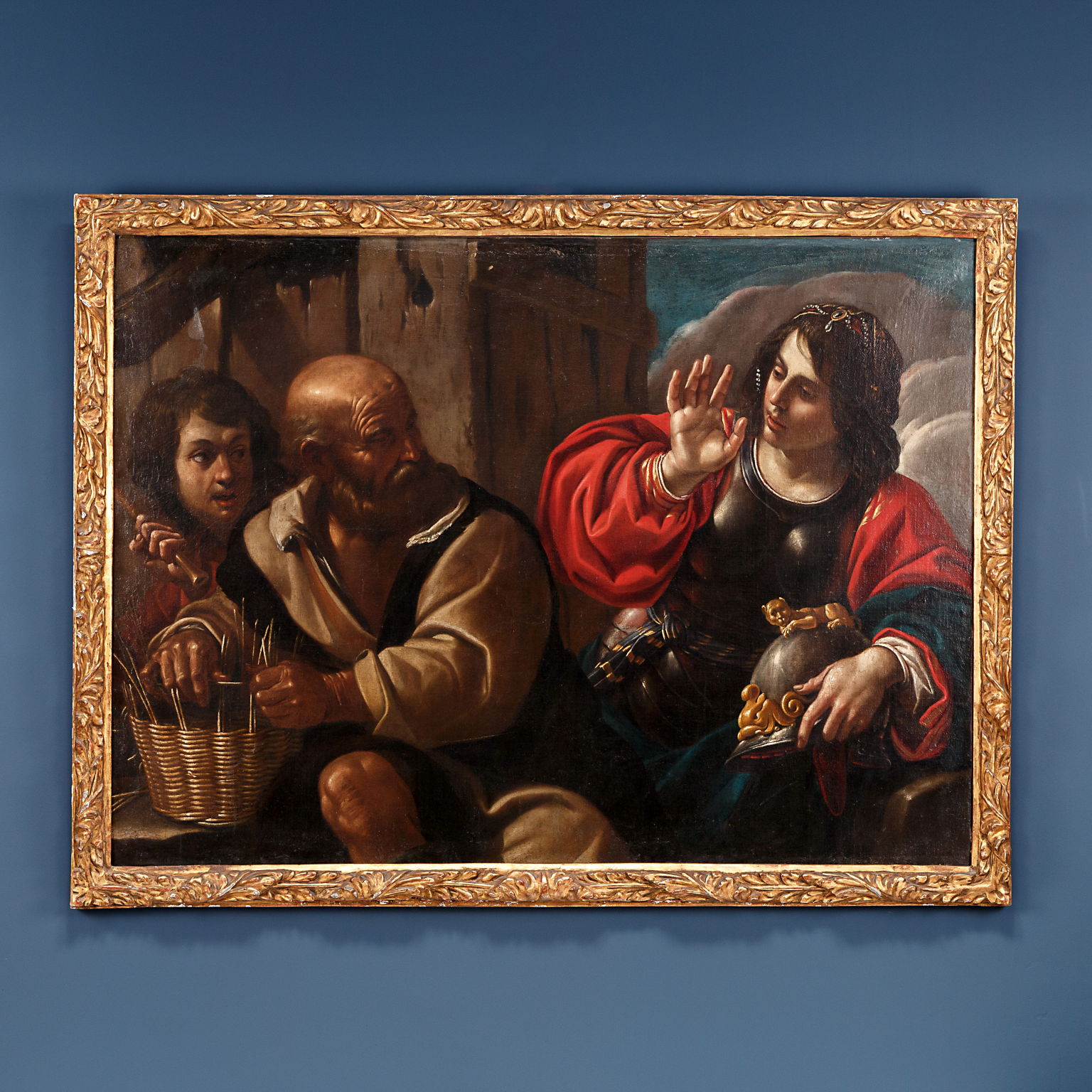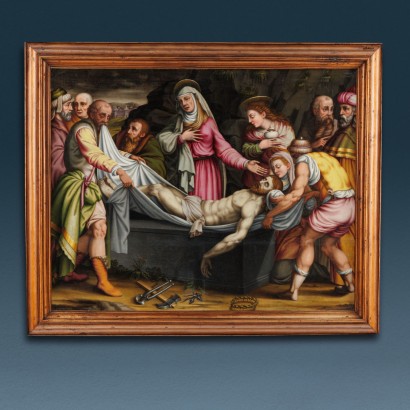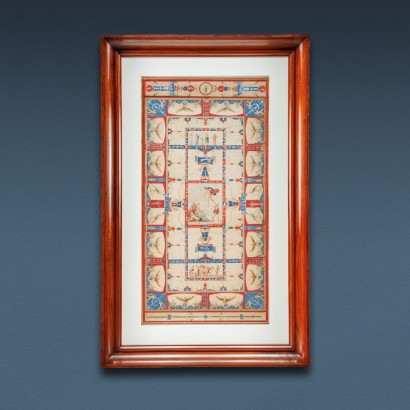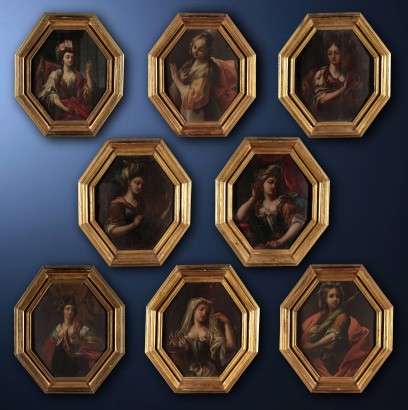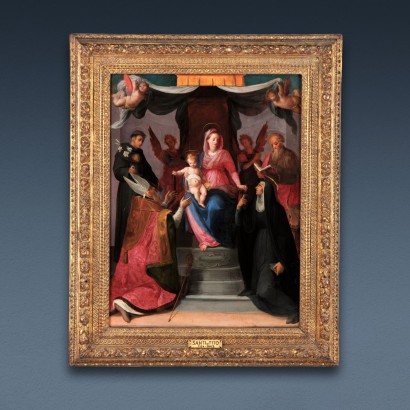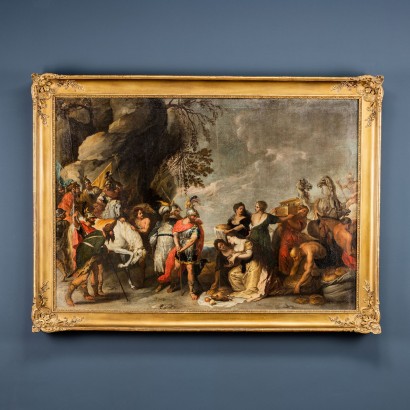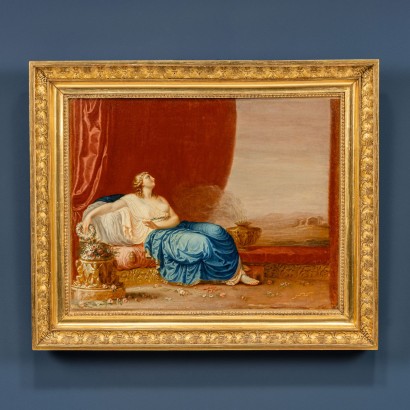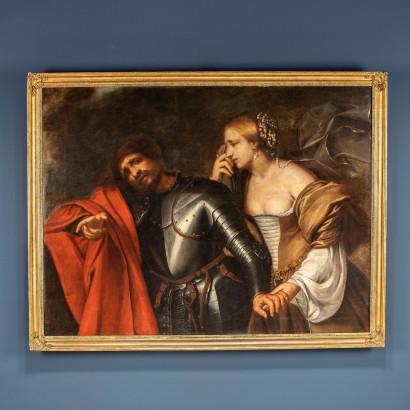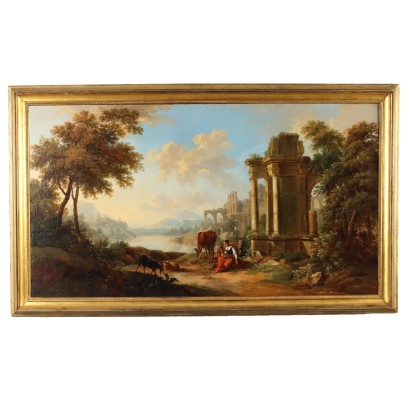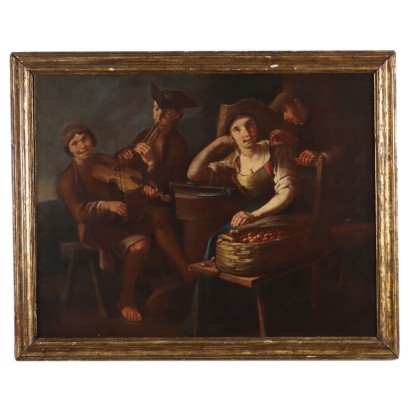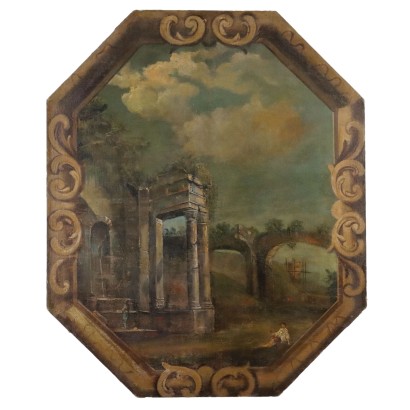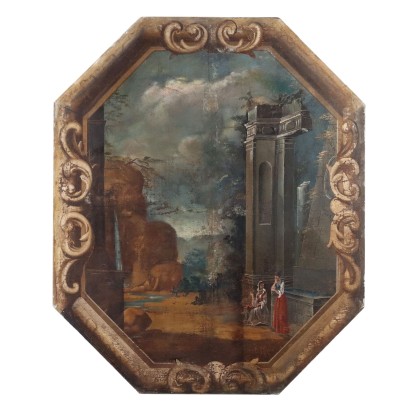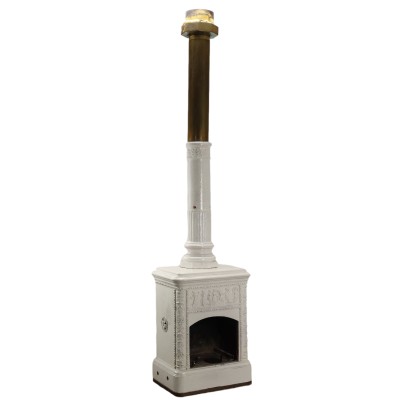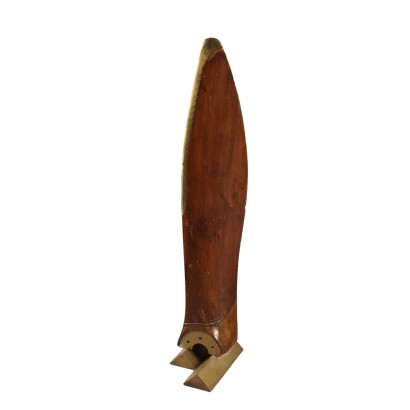Erminia meets the shepherds - Second Half Twenties of the 17th century
Features
Second Half Twenties of the 17th century
Artist: C. Gavassetti (1596-1630)
Artwork title: Erminia incontra i pastori
Origin: Italy
Description : Erminia incontra i pastori
The oil on canvas depicts, on the right, a young woman with dark hair gathered and held back by pearl ribbons. She is dressed in warrior clothes: she wears a red tunic with wide sleeves, while her torso is protected by metal armor; with his left arm he holds a helmet, decorated on top with a golden lioness. The opposite arm is raised in greeting, facing a pair of shepherds on the doorstep of a house. The one in the foreground, older and bearded, is busy weaving a wicker basket, interrupted in his work, wearing simple, ocher-coloured clothes; further away, in the background, there is a young man with a whistle, long hair and a beardless face, with an expression of amazement in his gaze.
Product Condition:
Product in good condition, with small signs of wear.
Artwork dimensions (cm):
Height: 114
Width: 156
Additional Information
Notes historical bibliographic
The scene represented refers to an episode in the Gerusalemme Liberata by Torquato Tasso. Erminia, a pagan princess, had in fact stolen the armor of the warrior Clorinda to be able to reach her beloved Tancredi, wounded on the battlefield at night; but escorted by the enemies and mistaken for the fighter, she is however forced to flee into the woods to save herself. Here he meets some shepherds, including an elderly gray-haired man who had been agricultural councilor at the court of Mengi, but who, having known the injustice of the courts, had decided to retire to a simple and pure life; Erminia herself decides to follow his example. As Dr. Massimo Pulini indicates in his report, the author is undoubtedly identifiable with Camillo Gavassetti, a Modenese painter active between Modena and Piacenza. If the setting of the scene looks at the composition of Guercino's work on the same subject, made for the Duke of Modena between 1619 and 1620, our painting is characterized by a completely autonomous character. In fact, it is possible to combine it with other certain works of his and, in particular, the comparison with a canvas recently passed on the antiques market, presented as an anonymous work, is interesting. Instead, it could plausibly be considered an original pendant to ours, a work by Gavassetti: an Erminia is depicted stripping off her possessions, thematically following the Encounter between Erminia and the shepherds, also being able to find similar measurements between the two canvases.Artist: C. Gavassetti (1596-1630)
Other customers have searched:
Se sei un appassionato d'arte, non perderti i nostri approfondimenti sul Blog Arte Di Mano in Mano e su FineArt by Di Mano in Mano - Arte:
Leggi di più
Ecco alcuni tra i principali articoli:Vedute
Falsi nell'arte antica
Un messaggio di fiducia per ripartire
La potenza espressiva dell'arte figurativa etiope
Breve Storia del Collezionismo
Giorgio Upiglio, maestro dei libri d'artista
Matthias Withoos detto "Calzetta bianca"
San Rocco pensaci tu - Classic Monday
Dai un'occhiata alle nostre rubriche di divulgazione sull'arte:
Epoche
Lavorazioni e tecniche
Mostre ed Eventi
Protagonisti
Se sei appassionato di pittura antica, con tutta probabilità gusterai le schede di questi stupendi quadri:
"Dio parla a Noè dopo il diluvio", Jacopo da Ponte, detto il Bassano, seconda metà XVI secolo
Crocifissione, maestro della misericordia dell'accademia, terzo quarto del XIV secolo
Erminia incontra i pastori, Camillo Gavassetti, Seconda metà anni Venti del XVII Secolo
Eroine dell'antichità, Francesco Conti, XVIII secolo
Hieronymus III Francken, La Negazione di Pietro, XVII secolo
Jefte e la figlia, Girolamo Forabosco e aiuti, XVII secolo
L'Accademia di Platone, piccolo arazzo, fine XVII - inizio XVIII secolo
Maddalena e San Giovanni Battista
Natura Morta, Bartolomeo Arbotori, XVIII secolo
Sacra Famiglia con San Giovannino, Bartolomeo Ramenghi, scuola di, prima metà XVI secolo
Testa Femminile, Andrea del Sarto, ambito di, post 1522
Uva, fichi, melagrana e pesche su un capitello - Maximilian Pfeiler, primo quarto XVIII secolo
Sapevi che l'arte può essere anche un ottimo investimento (e non solo per grandi portafogli)?
L'Arte tra Collezionismo e Investimento
FineArt: Arte come investimento
Product availability
Immediate availability
Ready for delivery within 2 working days from ordering the product.

